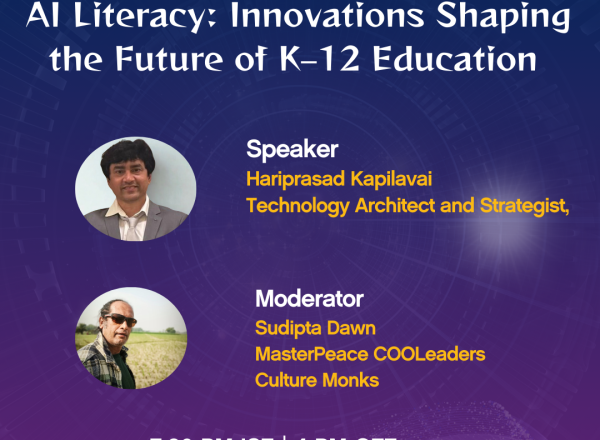AI Literacy: Innovations Shaping the Future of K–12 Education

Sudipta Dawn
Culture Monks & MasterPeace COOLeaders
The May 2025 session of MasterPeace COOLTalk, titled “AI Literacy: Innovations Shaping the Future of K–12 Education,” was conducted by Hariprasad Kapilavai on May 23, 2025, and moderated by Sudipto Dawn. Participants from Africa, Europe, America, and Asia attended the session.
COOLTalk is a regular part of the MasterPeace COOLeaders program. MasterPeace COOLeaders aims to build a new and creative leadership or change makers who bring fresh perspectives and ethical approach filled with care for the natural ecology, mental, physical, economic well being along with a sense of social justice and liberty. The COOLTalk is a way to build awareness and start a dialogue about the key issues pertaining affecting the ecology, society & the individual and creative approaches for enabling and sustaining change.
The phenomenon of AI is changing the, world and is going to have a profound impact on everyone. As such it can widen the divide in the global south-north context leading to ecological, democratic and social crisis. This COOLTalk addressed this issue bringing into focus as to how AI can be integrated into the school education process to enable the students to navigate a new world where they have to co-exist and compete with AI driven consciousness.
Hariprasad Kapilavai is a seasoned technology architect and strategist with deep expertise in multi-cloud integration, enterprise architecture, and AI-driven digital transformation. With an MBA in IT and a B.Tech in Computer Science, he currently serves as a Senior Technology Architect, leading award-winning global initiatives in cloud, AI, and platform modernization. A Senior Member of IEEE and recipient of the Indian Achievers Award, Hari is recognized for his innovation, leadership, and advisory roles across major digital programs. Certified in AI, cybersecurity, and cloud platforms, he is a passionate advocate for reshaping technology education and enterprise readiness in the AI era.

✅ Foundational Importance of AI Literacy (K–12)
- AI is shaping the daily lives of children; early education must equip them to understand, question, and shape this technology.
- AI literacy is essential for equity, opportunity, and democratic participation—not just technical careers.
✅ Global Frameworks Guiding AI in Education
- UNESCO promotes human-centered, ethical AI education.
- ISTE’s AI4K12 framework introduces five core AI concepts: perception, representation, learning, interaction, and societal impact—adaptable across all grade levels.
Innovations by Education Level
✅ Elementary (K–5): “Playful AI”
- Voice Assistants & Storytelling Bots: Introduce natural language processing through interactive reading.
- Robotics Kits (Cozmo, LEGO SPIKE, Cubetto): Blend coding and creativity to teach algorithmic thinking.
- Visual Learning Tools (Quiver, Teachable Machine): Make machine learning concepts intuitive and tangible for young minds.
Goal: Spark curiosity and build foundational intuition—AI is not magic, but a tool built by humans.
✅ Middle School (6–8): “Exploring Ethics and Algorithms”
- Teachable Machine & MIT App Inventor: Deepen understanding of training data, model accuracy, and algorithmic decisions.
- Games and Role-Playing: Tackle AI bias, privacy, and ethical dilemmas through interactive learning.
- Cross-Disciplinary Creativity: Use AI in art, music, and storytelling to expand student engagement.
- Real-World Projects: Apply AI to weather prediction, plant diagnostics, and social issues.
Goal: Foster critical thinking and ethical inquiry—AI systems are created by people, and reflect human choices.
✅High School (9–12): “Building with AI”
- Technical Projects (Python, TensorFlow Lite, Edge AI): Hands-on coding of real AI systems using accessible hardware.
- Career Pathways: Industry mentorships, career talks, and internships connect AI learning to real futures.
- AI for Social Good: Students build chatbots, sentiment analysis tools, and sustainability apps.
✅Open-Source Curriculum: Tools like Google’s AI for Anyone and Microsoft’s AI for Beginners democratize access.
Goal: Empower students to build, critique, and apply AI responsibly—developing leadership and innovation for the digital age
Early AI literacy is not a luxury—it’s a necessity. By introducing AI across all grade levels, we’re not just preparing students for tomorrow’s workforce; we’re cultivating thoughtful, ethical leaders who can shape the future with wisdom, creativity, and responsibility.
The keynote address provoked many questions from he participants. Nico de Klerk from South Africa expressed his fear that AI will lead to loss of job and freedom, while January from Malawi felt that the teachers at the Innovation Center which he has established need to be updated about integrating AI into their education system. Enock from MasterPeace Uganda wanted to explore ways though which AI could be integrated with a project for early education which he is in the process of devising.
There are also severe concerns as to how the market forces will manipulate AI to further drive consumerism bd radical behavior in societies. The need for AI driven education or information system for children and teenager needs to be responsible and responsive to the cultural norms of the diverse communities around the world. It was decided that Hari and MasterPeace will work towards briding he AI divide by building capacity and resources for communities in Africa and Asia.
Once again it was an engaging and enriching MasterPeace COOLTalk thanks to Hari for making it meaningful for he MasterPeace community around he world.
